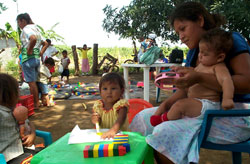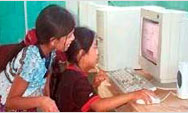You are here » Home » Telling Our Story
Success Story
Food assistance and child development go hand in hand at a community center
Better Nutrition, Better Health

| |
Photo: USAID/Jan Howard
|
|
Families meet at a rural children's center to monitor their children's development and receive complementary food.
"We have learned how to prepare a variety of nutritious meals with the food we receive, and our children are growing healthy and strong," said Eduvina.
|
On a large padded blanket spread out on the ground, infants lie amongst brightly colored plastic blocks,
their mothers dangling toys within their reach. Nearby, toddlers sit at colorful tables connecting blocks or
drawing with markers and crayons. They are at the home of Josefina Garcia, participating in an early childhood
stimulation program supported by USAID. Twice a week, mothers from the small rural community of La Tejana,
Nicaragua, bring their children to Josefina's home, which offers some of the children their only chance to play with toys.
Josefina generously provides her humble dwelling as a Casa Rural del Niño — Rural Children's Center —
where infants are weighed monthly to monitor growth, and parents and children participate in activities that
promote child development. In addition, pregnant women and families with children under two years of age
receive complimentary food rations.
Under this program, USAID provides assistance to more than 21,000 families in communities across
Nicaragua that are identified as high risk for malnutrition and infant mortality. The complementary food
provides an incentive for families to come to the Casa, where they receive counseling on how to improve
their diets, especially when the child is ill or undernourished.
The program has contributed remarkably in improving maternal and child health in Nicaragua.
The infant mortality rate has dropped from 58 per 1,000 live births in the mid-1990s to 31 today.
Chronic childhood malnutrition — "stunting" — fell to 20 percent in 2002, and the number of children with
diarrhea has also been drastically reduced.
Testifying to the success of the program are the smiling, healthy children at Josefina's Casa.
Said Eduvina Hernandez, a mother participating in the program, "We have learned how to prepare a
variety of nutritious meals with the food we receive, and our children are growing healthy and strong."
Print-friendly version of this page (60kb - PDF)
Click here for high-res photo
Back to Top ^ | 

